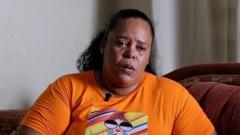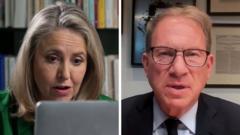Amidst rising tensions over US immigration policies, Venezuelans facing deportation have been caught in a web of fear and uncertainty. Families claim innocent loved ones are misidentified as gang members due to superficial markers, as seen in the recent case of Francisco José García Casique who was deported to a maximum security prison in El Salvador.
Deported or Innocent? Families Fear for Loved Ones Amid Controversial US Deportations

Deported or Innocent? Families Fear for Loved Ones Amid Controversial US Deportations
A mother’s heartbreaking discovery of her son amidst deported Venezuelan detainees raises questions about US immigration policies and the implications for innocent migrants.
In the Venezuelan city of Maracay, Myrelis Casique López anxiously awaited her son's return from the United States, where 24-year-old Francisco José García Casique had migrated 18 months earlier in search of better opportunities. However, after a brief conversation before his supposed deportation back to Caracas, she was devastated to discover footage of her son among detainees at the Terrorism Confinement Centre in El Salvador, not returning home as she had hoped.
"This isn’t how it was supposed to be," Myrelis said in disbelief. She maintains that her son is innocent and denies any affiliation with gangs. Despite US immigration officials' assertions that deportees were carefully vetted for links to the Tren de Aragua gang, many families, including those of other deportees like 29-year-old Mervin Yamarte, argue that their relatives are victims of mistaken identity, often attributing their detainment to tattoos or superficial appearances.
The Trump administration justifies these deportations under the 1798 Alien Enemies Act, claiming a robust protocol to identify gang members. Nonetheless, U.S. Immigration and Customs Enforcement (ICE) has acknowledged that many deportees do not possess criminal records. While the government's crackdown on a notorious gang is underscored by the accusations of violent crimes, advocates express fear for the innocent, suggesting that the identification process lacks adequate standards, leading to wrongful deportations.
For many, like Adelys Ferro from the Venezuelan-American Caucus, there is an underlying anxiety over the sweeping nature of these deportations. "Of course we're afraid. We're terrified," Ferro remarked about the atmosphere within the Venezuelan community in the U.S., which has historically faced targeting actions.
Though many Venezuelans in the U.S. support a firm stance against the Maduro regime, recent policy shifts, including the termination of Temporary Protected Status for Venezuelans, exacerbate the community's concerns about returning to a country in crisis. Legal experts and ordinary migrants alike are left questioning the stability of their futures.
As Myrelis Casique and other families continue to fight for their loved ones, the broader implications of this immigration strategy draw national scrutiny, reflecting the complex intersections of citizenship, safety, and identity in contemporary U.S. policy. With innocent individuals caught in the crosshairs of enforcement, the discourse around immigration and gang crime remains fraught with uncertainty and fear for many vulnerable families.





















